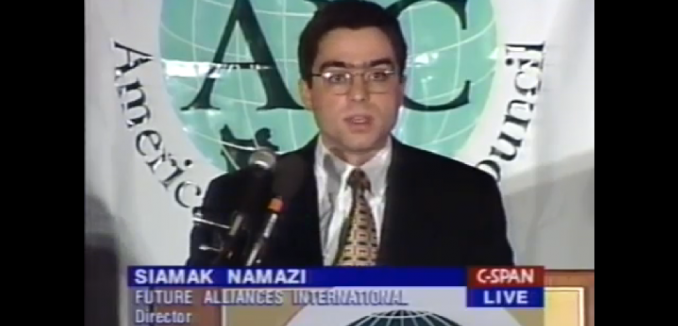Siamak Namazi, an Iranian-American businessman who was arrested in October by the intelligence arm of Iran’s Islamic Revolutionary Guard Corps (IRGC), has been denied access to his lawyer, Reuters reported on Sunday.
Mahmoud Alizadeh Tabatabaei, Namazi’s lawyer, told Reuters that he has not received permission from the head of Iran’s judiciary to meet with his client. This permission is necessary in cases involving crimes related to national security. Tabatabaei said that Namazi has not been informed of the charges against him.
The New York Times reported in November that Iranian authorities had grown increasingly anti-American and have cracked down harder on human rights in the wake of the nuclear deal last summer.
Ayatollah Ali Khamenei, the supreme leader, said the “Death to America” slogan is eternal. New anti-American billboards in Tehran include a mockery of the Iwo Jima flag-raising photograph that symbolized Marine sacrifice in World War II. And an Iranian knockoff version of K.F.C., the chicken chain widely associated with the United States, was summarily closed after two days.
“It feels like a witch hunt,” said one Iranian-American businessman in Tehran, who dared not speak for attribution over fear for his safety. “It’s pretty scary.”
Iranian actress Sadaf Taherian was forced to flee the country at the time after she posted pictures of herself on social media with her hair uncovered. Two Iranian poets were sentenced to 99 lashes each for shaking hands with members of the opposite sex.
Ahead of Iranian parliamentary elections later this week, the Guardian Council, which vets candidates, disqualified 99 percent of those who were considered to be reformers. They also barred a reform-minded grandson of Ayatollah Ruhollah Khomeini, the founder of the Islamic Republic, from running for the Assembly of Experts, which chooses the next Supreme Ruler. The disqualifications will serve to strengthen the power of hardliners in Iran.
Shortly after the nuclear deal was signed, Lee Smith, a senior fellow at the Hudson Institute, warned that the agreement would strengthen the IRGC’s hold over Iran.
[Photo: Iran’s New Parliament / C-SPAN ]




